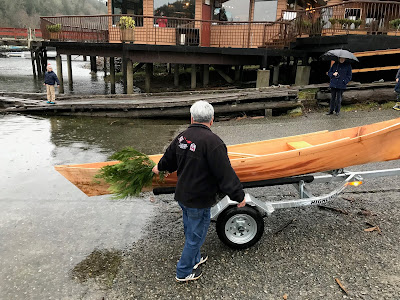 |
| Image from www.gutenberg.org |
BC we had a lot to learn. We spoke American English (California style). Canadian English has some words spelled and pronounced differently (British style), but basically it's the same. However, a few words are unique.
First Nations peoples of the Pacific Northwest are seafarers. Mutual trade up and down the coast was established using language commonalities. When Europeans arrived, there were no similarities. Exploration was a focus, but trade was desired.
Without language, trade is difficult. A pidgin language was already used among First Nations. It was later expanded to include words from English, French and Spanish.
A pidgin language combines words from different languages. It's not a primary language. It's used for people with differing language backgrounds to communicate. Grammar is simple and vocabulary limited.
In the Pacific Northwest it's called Chinook Jargon (. In 1863, George Gibbs compiled the Dictionary of Chinook Jargon, or, Trade Language of Oregon (New York: Cramoisy Press). It's available free online at the UBC Open Library and Gutenberg Project.
The first Chinook Jargon word we heard was chuck. Chuck means water and can be combined with other words for precision. Saltchuck is saltwater or the ocean. Chuck for short.
 |
| Out on the chuck, motoring through Seymour Narrows. |
Skookum is strong, so skookumchuck means strong water. Aptly named Skookumchuck Narrows near Egmont at the mouth of Sechelt Inlet has strong tidal currents that result in dangerous standing waves. Here's a drone video by Jorgen Bjerke.
Powell River is in the traditional territory of the Tla'amin First Nation. We are working through reconciliation for atrocities imposed on indigenous peoples across Canada. To help create better mutual understanding, the Tla'amin Nation reached out to the Powell River community through the Hɛhɛwšɩn canoe carving project.
 |
| Canoe carving was conducted at Willingon Beach park in town. |
Two canoes were completed, one large for tribal journeys and one youth sized.
 |
| The small canoe blessing was held at Powell Lake in February 2018. |
I feel lucky to live in a place with such rich cultural history. Do you have any unique words where you live? What do they mean? -- Margy
Reading Wayne's books I wondered about "chuck." I figured it out from the context, but the whole jargon concept is extremely interesting. It's always fascinating to live so close to another culture. There is so much to appreciate.
ReplyDeleteContext is a great tool for defining unknown words. You can imaging how hard it was for two groups of people trying to communicate with nothing in common. - Margy
DeleteHello, it is interesting learning new cultures. Beautiful photos and video. Enjoy your day, wishing you a happy new week!
ReplyDeleteSkookumchuck Narrows is a very scary place, there's another video of it swallow a large commercial barge. Yet, the kayakers ride those waves all the time. We've been through there in our boat but always, always wait for slack water between tides. - Margy
DeleteIt's always nice to learn new things. Lovely photos too!
ReplyDeleteYes it is. Must be the former teacher in me. - Margy
DeleteNot dissimilar to our Hawaiian Creole English we call Pidgin. All the plantation workers from Hawaii, Asia, the Azores, and elsewhere could all communicate and still we have pidgin to this day as a local solidarity cultural treasure.
ReplyDeleteWe just had dinner last night with a woman who was born in the Azores. She still has family property there and with her husband (they live here in Canada now) they are revitalizing the family vineyard back home. - Margy
Delete,,,the Hawaiian pidgin language is fun to hear!
ReplyDeleteMoving or visiting a new place always lets you hear new words and sayings. - Margy
DeleteFascinating. Must be how Lewis and Clark manage to eat....
ReplyDeleteHand gestures also help when there are no words in common. - Margy
DeleteMargy - a fascinating post, and the drone video was mouth-dropping, especially the part with the talented kayaker. Yikes! I don't know of any unique Montana words, but maybe I have not been here long enough!
ReplyDeleteLet me know if you find one. - Margy
DeleteI can relate to the language differences. Moving from the US to New Zealand had more barriers than I ever imagined! My first 'problem' was 'pudding'; a type of dessert in the US but the word for dessert in New Zealand :)
ReplyDeleteI'm delighted to have you join 'My Corner of the World' this week!
My Corner of the World
I have a friend from New Zealand here in BC. He's been here over 20 years, but to listen to him he sounds like he just arrived. - Margy
Delete